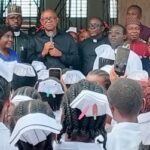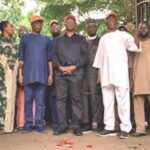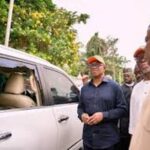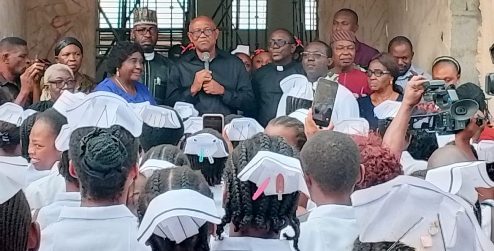
LAGOS SEPTEMBER 14TH (NEWSRANGERS)-The United States Institute of Peace (USIP) said outcome of research it conducted across states in Nigeria revealed that most Nigerians believe that the President Muhammadu Buhari’s administration has failed to meet their expectations since coming to power on May 29, 2015.
The report also predicted an upsurge in electoral violence and voter apathy during the 2019 general elections.
The report entitled, ‘Nigeria’s 2019 Elections: Change, Continuity and the Risk to Peace’, is a presentation of USIP’s electoral violence risk assessment research which was arrived at after interviews conducted in some selected states across the country.
Based on interviews conducted in Adamawa, Anambra, Ekiti, Kano, Lagos, Plateau and Rivers states and in the FCT, the report said that the approach to confronting electoral violence in Nigeria has changed a little since 2015, despite significant shifts in the political and security contexts.
“These shifts include changing narratives about insecurity and the increased prominence of intra-political party disputes relative to the previous elections, which suggest that significant electoral violence is likely to occur in the period before balloting.
“Nigeria’s history of electoral violence is, for many, an unfortunately accepted fact of life, and cannot be viewed in isolation from the many social and economic inequalities, ethnic and religious divisions, and structural weaknesses such as corruption and weak state capacity.
“While many conventional risks of election violence endure, including the willingness (or not) of candidates to accept the results, the use and abuse of state power to unfairly favour incumbents, and the ease with which young people can be mobilised toward violence, a simplistic narrative that violence is ever present and inevitable obscures important contextual changes in Nigeria since 2015. These changes, documented in this report, demonstrate the need to disaggregate electoral violence’s causes and contributing factors if such acts are to be properly understood, contextualized, and mitigated”.
The report said the failure of the ruling All Progressives Congress (APC) to manage its internal affairs successfully will contribute to violence in the forthcoming polls.
“Divisions within both the APC and the PDP were largely seen as being more consequential now than the historic interparty disputes that characterised the run-up to the 2015 elections. Particularly in the ruling APC, the inability of the party to consolidate its internal party structure and effectively resolve internal rivalries is expected, in many states, to potentially lead to violence, with party primaries and nomination processes particularly vulnerable to disruption. Nigeria has long been plagued by weak political parties, and intraparty conflict is not new, so this trend may represent a reversion to, or intensification of, pre-2015 norms”.
“Despite the risks, serious violence in 2019 is not inevitable, even if that possibility seems great. The Nigerians interviewed in the course of this research have a keen sense of what is necessary for peace, whom they hold most responsible for violence, and what can be done to confront and deter those who seek to perpetrate violence.
“As one person interviewed for this report remarked, ‘there is no magician necessary’ to ensure elections are largely peaceful. Many others argued for preventive action to be more locally grounded.
“The best party…to engage for nonviolence [is] always the local people because they have the most to lose,” argued one interviewee from Rivers State”.
Going further, the report said “across the states surveyed, as well as across socioeconomic classes and political persuasions, opinions about Nigeria’s key electoral actors are strikingly common, reflecting a broader narrative of mistrust and uncertain confidence in state institutions.
“Of all the state’s institutions, most respondents felt that peaceful elections in 2019 are contingent on the performance of Nigeria’s INEC. Given the relative success of the 2015 elections, they felt that INEC ought to be able to deliver credible elections again in 2019. They feared, however, that any regression from the level of performance achieved in 2015 could lead to violence because some would view the failings not as a result of incompetence but as deliberate attempts to frustrate the will of the voters”.
“Yet, while the potential for election violence exists, there are signs of hope. Some states have developed successful election conflict-mitigation practices. In the short amount of time remaining, INEC and the police should undertake a number of key reforms. The United States, along with other international supporters of the electoral process, should also intensify their efforts to reinforce the work of these key Nigerian institutions.
“The first-ever peaceful transition of power in 2015 raised expectations for government performance. Many Nigerians feel their hopes have not been met. Some respondents suggest the electorate is sufficiently disappointed that voter apathy will be greater in 2019 than in 2015, with the unifying narrative of change that helped elect the APC in 2015 much less compelling as a factor in mobilising the electorate, and perceptions that another defeat of the presidential incumbent is less likely to happen in 2019.
“Disappointment with the APC that leads to lower voter turnout could have implications for a rise in electoral violence in two possible ways: fearing lower turnout in ruling party strongholds, some posited that violence could be used in opposition areas to deter relatively better turnout. Alternatively, some felt that intimidation tactics to shore up the vote could be used to coerce otherwise reluctant voters to participate”.
US Report Indicts Buhari For Not Meeting Most Nigerians’ Expectations, Foresees Violence










